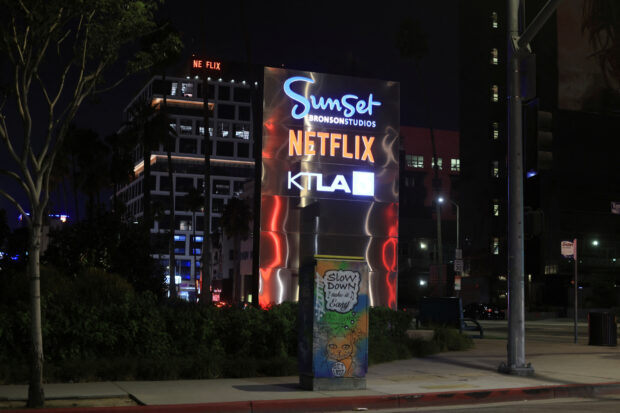
A general view outside the Netflix office after the Writers Guild of America (WGA) said it reached a preliminary labor agreement with major studios in Los Angeles, California, U.S., September 24, 2023. REUTERS/David Swanson
LOS ANGELES — Talk show producers started planning new episodes on Monday, the first steps to put Hollywood back to work after writers reached a tentative deal to end their nearly five-month strike.
The Writers Guild of America (WGA), which represents roughly 11,500 film and television writers, reached a preliminary three-year deal with major studios on Sunday. The agreement still must be approved by the union’s leadership and members.
While actors remain on strike, late-night and daytime talk shows may resume production once their writers receive the Guild’s greenlight to return to work in the coming days or weeks.
“The Drew Barrymore Show” is aiming to go back on the air in October, a source with knowledge of the plans said. Barrymore had sparked a backlash by announcing she was going to bring the show back in mid-September, a decision she reversed.
Representatives for late-night shows such as “Saturday Night Live” and “The Tonight Show with Jimmy Fallon” had no comment on when they would air fresh episodes.
Scripted series will not be able to resume filming until the SAG-AFTRA actors union reaches an agreement with studios. The actors walked off the job in July, demanding higher wages and limits to the use of artificial intelligence on screen.
Film and television producer Todd Garner said he expects that once actors reach a deal, scores of productions will race to restart at once.
“Remember during the pandemic, when Long Beach had all of those ships waiting?” said Garner, referring to the logjam of cargo ships stranded in the southern California port. “That’s our business right now. I’m guessing there are 250 ships in the harbor right now.”
Major television shows and movies are contractually in first position with actors, Garner said. Work on uncompleted projects such his own movie, “Mortal Kombat 2,” will need to be finished first, before other projects can get under way.
“Until we get all these big ships out of the harbor, nothing new is going to be started, unless it’s with actors who previously weren’t committed to something else,” Garner said.
Shares of big media companies gave up early gains on Monday.
Warner Bros Discovery closed down nearly 4%, Comcast fell almost 1% and Walt Disney dropped 0.3%.
Investors of the media companies have been concerned about the financial fallout from the strikes that had initially boosted cash flows due to lower spending, but has started eating into earnings.
The deal with writers “will also mean the studios and streaming services will now focus fully on actors’ demands,” said Susannah Streeter, head of money and markets at Hargreaves Lansdown.
“Already it’s likely that the big studios will face a significant hit in 12-18 months time, with so little in the pipeline and bosses are now desperate for new content to attract eyes to big and small screens.”
Warner Bros Discovery had earlier warned that the company’s full-year adjusted core profit would take a hit of up to $500 million due to project delays from disruptions.
Its shares have dropped nearly 14% since the writers’ strike started on May 2, while Paramount, Disney and Netflix have lost between 20% and 45%. In comparison, the benchmark S&P 500 index has risen nearly 5%.
Netflix, however, rose 1.3%. Analysts have said the streaming giant was better placed than its media rivals as it has production operations and staff in regions outside of the U.S., which are not impacted by the strike.
“The total spend on shows will be little changed, as studios will either cut spending from other elements of show production, or reduce the number of new shows they produce (a process already under way) to pay for increased costs from writers,” said Rosenblatt analyst Barton Crockett.